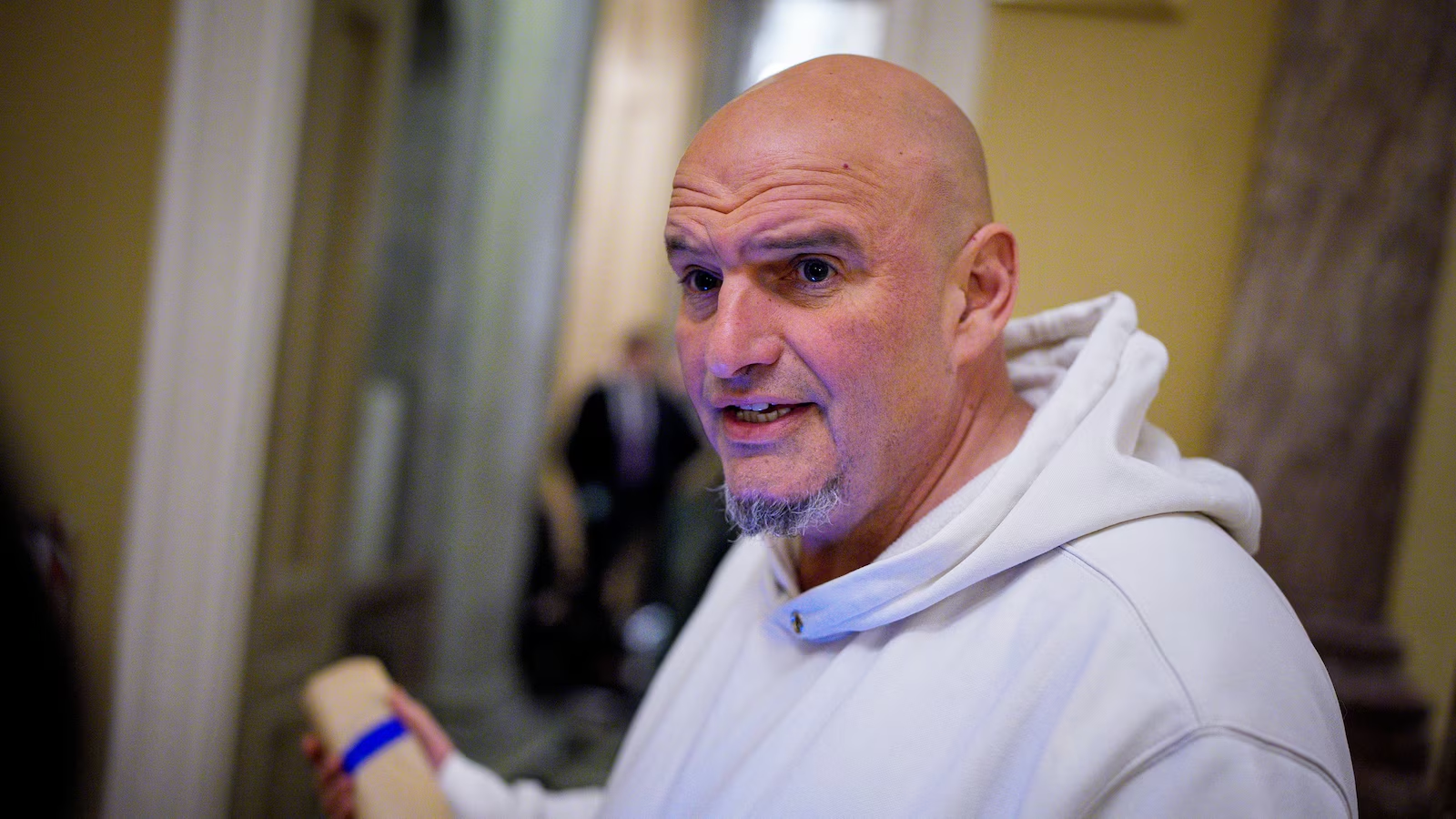Senator John Fetterman of Pennsylvania recently delivered a pointed critique of Democratic Party leadership, sparking significant discussion about the cohesion and direction of the party. In an interview on Fox & Friends, Fetterman made a striking remark when asked about who is effectively running the Democratic Party in Congress, responding bluntly that “no one really knows.” His comments were rooted in his frustration with the handling of the recent government shutdown, and they illustrate a larger tension between individual principles and party strategy. The Pennsylvania senator’s statements provide insight into the internal dynamics of the Democratic caucus, highlighting both ideological differences and challenges in leadership coordination.
Fetterman’s remarks were prompted by reports suggesting that Senate Minority Leader Chuck Schumer had privately encouraged moderate Democrats to keep the government closed through at least the start of Affordable Care Act open enrollment on November 1. According to Fetterman, he was not part of any such discussions and had not received outreach from Schumer regarding the shutdown negotiations. He stated, “I was not in a conversation, or I never got any outreach,” emphasizing that he had maintained a consistent public stance on the issue and that his colleagues were aware of his position. This absence of communication with the Senate minority leader underscores a perceived gap in coordination within the Democratic leadership, and Fetterman’s remarks suggest that some senators may feel disconnected from the strategic planning occurring behind closed doors.
Fetterman has long positioned himself as a legislator guided by principle rather than purely by party alignment. He explained that his opposition to the shutdown dates back months, asserting that he had “led the charge” to keep the government open as early as March. His early advocacy reflected a commitment to governance continuity and to minimizing harm to essential public services. The shutdown threatened critical programs and services, including Supplemental Nutrition Assistance Program (SNAP) benefits for millions of Americans, payroll for military personnel, and the operations of federal agencies such as the Capitol Police. Fetterman’s vote to reopen the government was a reflection of his concern for the practical impact of the shutdown on the daily lives of Americans, rather than a calculated partisan maneuver.
The senator’s approach illustrates a broader tension within the Democratic Party between strategic bargaining and pragmatic governance. While some party members may have viewed the shutdown as a leverage point to secure concessions, Fetterman emphasized the moral and practical imperatives of ending the stalemate. He described the shutdown as “a violation of my core values” and criticized fellow Democrats for using the situation as a political tool at the expense of the public. In his view, leveraging essential services and government payroll as bargaining chips undermines the fundamental responsibilities of elected officials and creates avoidable hardship for millions of citizens.
Fetterman’s remarks about leadership — specifically his assertion that “no one really knows” who is running the Democratic Party — are not a literal claim that the party lacks formal leaders. Senate Minority Leader Chuck Schumer and House Speaker-designate members have recognized positions of authority. Instead, Fetterman is articulating a perceived gap in effective coordination and guidance during a moment of crisis. His comments suggest that, in practical terms, the messaging, decision-making, and strategic alignment within the party may not be functioning smoothly, leaving rank-and-file members to navigate complex legislative challenges on their own. By framing the issue this way, Fetterman is highlighting the distinction between formal authority and actionable leadership.
This is not the first time Fetterman has diverged from the majority position of his party. His willingness to vote against party expectations demonstrates his commitment to principle-based decision-making. During the recent government shutdown, he joined a small group of Democrats and Democrat-aligned independents who voted with Republicans to reopen the government without securing additional concessions on healthcare subsidies. His decision reflects an emphasis on governance and responsibility over ideological or tactical considerations. By taking this stance, Fetterman publicly challenged the notion that party loyalty should override the immediate needs of citizens and the operational continuity of the federal government.
Fetterman also addressed the broader implications of the shutdown. He argued that the political tactic of holding essential services hostage has tangible consequences, placing “42 million Americans with SNAP benefits” at risk, creating uncertainty for military personnel, and potentially compromising public safety. He stressed that such actions cross ethical boundaries, reinforcing his view that effective governance requires placing public welfare above political leverage. His critique of his colleagues’ approach serves as both a reflection on the current state of the party and a caution about the potential fallout from politically driven gridlock.
The senator’s comments further suggest a vision for the Democratic Party that prioritizes inclusivity and principle-driven governance. By invoking the concept of a “big-tent party,” Fetterman signaled his desire for a political organization capable of accommodating diverse perspectives while maintaining core values. This framing emphasizes that internal disagreement should not preclude collective action on essential matters, and it positions Fetterman as an advocate for balancing ideological diversity with practical responsibility. His call for a more unified, values-centered approach resonates with broader debates within the party about how to reconcile competing priorities, including progressive policy objectives, moderate pragmatism, and responsiveness to public needs.
Fetterman’s critique also underscores the tension between individual accountability and party strategy. Senators and representatives often navigate complex landscapes where personal principles, constituent interests, and party priorities intersect. In this case, Fetterman prioritized his personal and ethical judgment over the strategic calculations of party leadership, arguing that the immediate welfare of Americans should not be compromised for political gain. His position raises questions about how party cohesion is maintained and the extent to which leadership can effectively marshal members without alienating those who act independently based on principle.
The impact of Fetterman’s comments extends beyond the specific legislative context of the government shutdown. By publicly questioning the clarity and efficacy of Democratic leadership, he contributes to a broader conversation about transparency, accountability, and responsiveness in political parties. The remarks invite reflection on how political organizations manage internal dissent, communicate strategy, and maintain credibility with the public. In an era of heightened scrutiny and polarization, the ability of a party to demonstrate cohesion and effective leadership has tangible implications for both governance and public trust.
Fetterman’s statements also resonate within the larger narrative of his political career, which has been marked by advocacy for transparency, bipartisanship on certain issues, and responsiveness to constituent needs. His approach contrasts with more ideologically driven tactics that prioritize negotiation leverage or strict party alignment. By emphasizing principle-driven governance, Fetterman is positioning himself as a voice for practical problem-solving and ethical accountability. This perspective may influence internal discussions within the Democratic caucus and shape public perceptions of the party’s approach to leadership and legislative priorities.
The senator’s comments were made in the broader context of the revised government funding bill approved by the Senate, which would keep federal operations running through January 30, 2026, and provide funding for SNAP, veterans’ programs, and congressional operations through the end of September. The House is expected to pass the measure, ensuring that essential services are maintained while highlighting the consequences of prolonged negotiation and legislative brinkmanship. Fetterman’s critique of the shutdown and party leadership illustrates the real-world implications of political standoffs, emphasizing the human and operational costs that accompany delayed decision-making.
Beyond his political stance, Fetterman has also shared aspects of his personal journey that inform his perspective. During the same period, he promoted his memoir, detailing his career in public service and his experiences with depression. His reflections on overcoming personal challenges add depth to his public statements, framing his approach to leadership, ethics, and decision-making as informed by lived experience and resilience. By sharing both personal and political insights, Fetterman reinforces the connection between individual values and public responsibility.
Ultimately, Senator Fetterman’s comments serve as a critical reflection on the state of Democratic Party leadership and internal dynamics. His assertion that “no one really knows” who is in charge should be interpreted not as a literal absence of authority, but as a critique of coordination, direction, and effective leadership within the party during a period of high-stakes negotiation. His principled stance on reopening the government, concern for public welfare, and willingness to diverge from party expectations highlight broader questions about how political parties balance ideology, pragmatism, and governance responsibilities.
The broader implication of Fetterman’s critique is a reminder that leadership in a political party is not solely a matter of holding a title; it requires clear communication, effective coordination, and an ability to align members behind shared principles. When these elements are perceived to be lacking, even senior party leaders may face public scrutiny and internal challenges. Fetterman’s statements reflect this dynamic, emphasizing the importance of accountability and the potential consequences when political strategy takes precedence over the immediate needs of citizens.
In conclusion, Senator John Fetterman’s remarks on the Democratic Party’s internal leadership and handling of the government shutdown illustrate the intersection of principle, governance, and party dynamics. His critique highlights tensions between individual ethics and party strategy, underscores the human and operational costs of political standoffs, and calls attention to the need for clarity, coordination, and accountability within the Democratic caucus. By emphasizing principle-driven decision-making and public welfare, Fetterman presents a vision of leadership that prioritizes ethical responsibility and pragmatic governance, providing both a critique of current practices and a framework for future discourse within the party. His comments contribute to a broader conversation about how political organizations can balance internal diversity, ideological commitments, and the practical demands of governing in a complex, high-stakes environment.

Emily Johnson is a critically acclaimed essayist and novelist known for her thought-provoking works centered on feminism, women’s rights, and modern relationships. Born and raised in Portland, Oregon, Emily grew up with a deep love of books, often spending her afternoons at her local library. She went on to study literature and gender studies at UCLA, where she became deeply involved in activism and began publishing essays in campus journals. Her debut essay collection, Voices Unbound, struck a chord with readers nationwide for its fearless exploration of gender dynamics, identity, and the challenges faced by women in contemporary society. Emily later transitioned into fiction, writing novels that balance compelling storytelling with social commentary. Her protagonists are often strong, multidimensional women navigating love, ambition, and the struggles of everyday life, making her a favorite among readers who crave authentic, relatable narratives. Critics praise her ability to merge personal intimacy with universal themes. Off the page, Emily is an advocate for women in publishing, leading workshops that encourage young female writers to embrace their voices. She lives in Seattle with her partner and two rescue cats, where she continues to write, teach, and inspire a new generation of storytellers.









